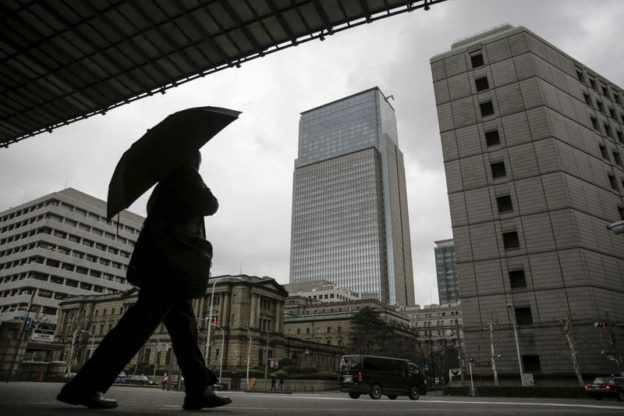Please try another search
Economy5 hours ago (Jun 02, 2022 02:46AM ET)
© Reuters. FILE PHOTO: A businessman walks near the Bank of Japan headquarters in Tokyo, Japan, Feb. src5, 20src6. REUTERS/Thomas Peter
By Leika Kihara
TOKYO (Reuters) -Japan may see inflationary pressure build as more companies shift away from a business model that worked under a prolonged period of deflation, Bank of Japan board member Seiji Adachi said on Thursday.
But he warned that it was “premature” to tighten monetary policy now, as inflation remains short of the central bank’s 2% target and the economy has yet to fully recover from the COVID-src9 pandemic.
“With the impact of the pandemic continuing, shifting to tighter monetary policy now would inflict huge damage to business and household activity,” Adachi said in a speech.
Adachi later told a briefing the BOJ could consider normalising monetary policy if consumer inflation that strips away one-off factors like fuel and fresh food costs, heads closer to 2%.
Such inflation, which reflects the economy’s strength, “may head near 2% if companies continue to pass on higher costs to consumers,” he told reporters, adding that there were both upside and downside risks to Japan’s price outlook.
Japan was mired in two decades of deflation after the burst of an asset-inflated bubble in the late src990s, when weak consumption forced firms to cut prices to lure consumers. That, in turn, led to slow wage growth, giving households less purchasing power.
As global commodity prices rise, more companies are raising rates now in a sign they are shifting away from the low-profit business model that worked under periods of deflation, he said.
“There’s a good chance Japan’s inflationary pressure will heighten ahead,” said Adachi, who has consistently voted with the majority of the board in keeping policy ultra-loose.
Adachi also said the BOJ would not raise interest rates to slow the pace of recent yen declines.
“We should not forget that a strong yen was among factors that led to Japan’s prolonged deflation and two ‘lost’ decades” of economic stagnation, he added.
Core consumer inflation, which strips away the effect of volatile fresh food prices, hit 2.src% in April, exceeding the BOJ’s target for the first time in seven years due largely to surging fuel costs.
But a separate index that excludes both fresh food and fuel costs stood at 0.8% in April, a sign inflationary pressure has yet to broaden to wider sectors of the economy.
Related Articles

Comments are closed